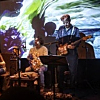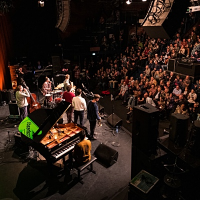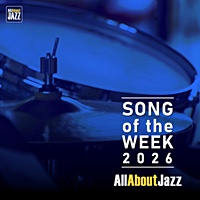Home » Jazz Articles » Franz Koglmann
Jazz Articles about Franz Koglmann
Franz Koglmann: Near Blue - A Taste of Melancholy

by Alberto Bazzurro
Inciso giusto un anno fa, nell'ottobre 2023, questo nuovo lavoro di uno dei musicisti forse meno valutati (forse anche perché appartati, anche stilisticamente) della scena jazzistica (in senso lato) contemporanea com'è fin dai tardi anni Settanta, Franz Koglmann (in Italia lo conoscemmo grazie alla Mitteleuropa Orchestra di Andrea Centazzo), ha la singolarità di essere “raddoppiato," nel senso che i 39 minuti coperti dai dieci brani che lo compongono vengono riproposti subito di seguito alla loro prima versione in una seconda, ...
Continue ReadingFranz Koglmann Septet: Fruits Of Solitude

by Mark Corroto
Franz Koglmann must be a connoisseur of vinification, i.e. winemaking, because his Fruits Of Solitude has the feel of a master vintner at work. Specifically, wine blends like Super Tuscans or Côtes du Rhônes mark his amalgam of European chamber music and American jazz. Koglmann is a true polymath in that he hears all and rejects any codifications, much like Duke Ellington did throughout his long career. As for Ellington, his classic “Solitude" is the inspiration for the ...
Continue ReadingFranz Koglmann, Mario Arcari, Attila Pasztor: g(ood)luck
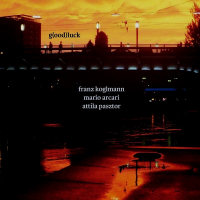
by Alberto Bazzurro
Torna Franz Koglmann, di cui avevamo un po' perso le tracce, e rinverdisce umori e architetture del glorioso trio KoKoKo (Koglmann Koltermann Koch), sempre col suo flicorno (più di rado la tromba) a dialogare morbidamente con un'ancia e un arco grave. Oggi le geometrie appaiono se possibile ancor più oleate, l'ancia è doppia, e il lessico calato in atmosfere più classiche (nell'accezione più larga del termine), meno incline all'azzardo, talora persino all'antigrazioso (là). Si parte con un ...
Continue ReadingFranz Koglmann: Join!
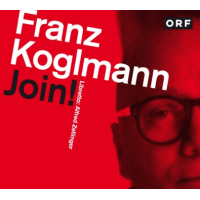
by Eyal Hareuveni
Austrian, Vienna-based composer Franz Koglmann always used music as a means to present his ideas, often provocative perspectives, on cultural phenomena at large. He alienated the American jazz community with A White Line (hatART, 1990), where he sketched an alternative history of jazz based on white innovative musicians. Later he reconstructed the compositional ideas of Johan Strauss to modern jazz vocabulary on An Affair with Strauss (Between the Lines, 2000) and upstaged the poems of T.S. Elliot on Fear Death ...
Continue ReadingFranz Koglmann: Lo-lee-ta: Music on Nabokov

by Eyal Hareuveni
Viennese composer and trumpeter Franz Koglmann is a well-known commuter between the arts and modern chamber jazz. His subtle, sophisticated compositions create a set of mirrors that reflect a distinct artistic mean: literature on Make Believe (Between the Lines, 1999), inspired by Jean Cocteau; poetry on O Moon My Pin-Up (hatOLOGY, 1997), inspired by Ezra Pound and Fear Death By Water (Between the Lines, 2003), dedicated to poetry of T.S. Elliot; cinematic images on Venus In Transit (Between the Lines, ...
Continue ReadingFranz Koglmann: Lo-lee-taa - Music on Nabokov

by AAJ Italy Staff
La bella intervista di Paolo Peviani a Franz Koglmann, pubblicata nel febbraio di quest'anno nella rubrica Il Questionario di Proust [per leggerla clicca qui] evidenzia bene le coordinate entro cui si muove la musica del trombettista e compositore austriaco: i suoi gusti musicali privilegiano Lee Konitz e Jimmy Giuffre, l'arte di Bill Dixon e di John Cage; in letteratura si orienta verso Nabokov, Cocteau, Thomas Mann, Eliot; nel cinema ama Resnais, Rohmer e Antonioni. Grande figura del jazz europeo, Koglmann ...
Continue ReadingFranz Koglmann: Viewing Jazz through Other Arts
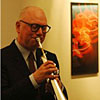
by Eyal Hareuveni
The music of Viennese composer/trumpeter/flugelhornist Franz Koglmann sounds like no other. He manages to marry his love for the West Coast cool jazz with elements from European modern and classic music composers, especially Franz Schubert, Alban Berg and Anton von Webern. His thematic compositions, recorded almost solely for the Swiss, Basel-based HatHut and for the German, Frankfurt-based Between the Lines labels, are complex. Quite often ironic and melancholic, always playful, detached from sentimentality but still very emotional, and usually demanding. ...
Continue Reading










